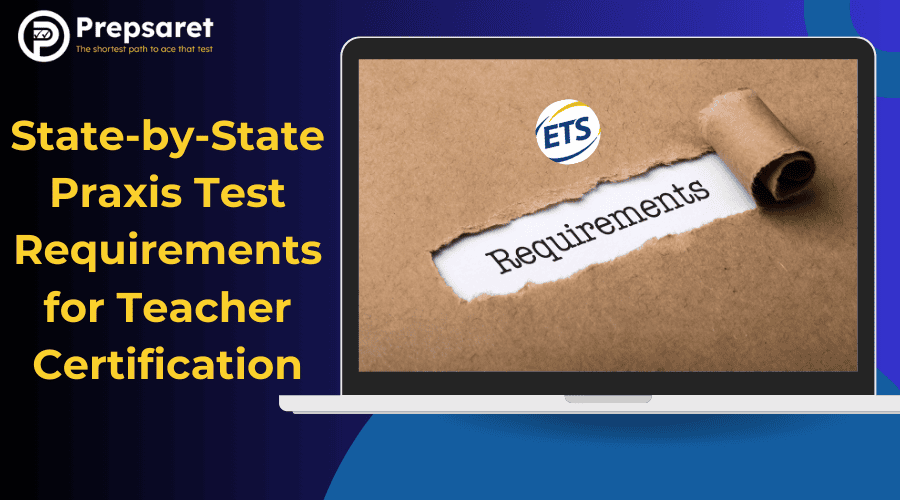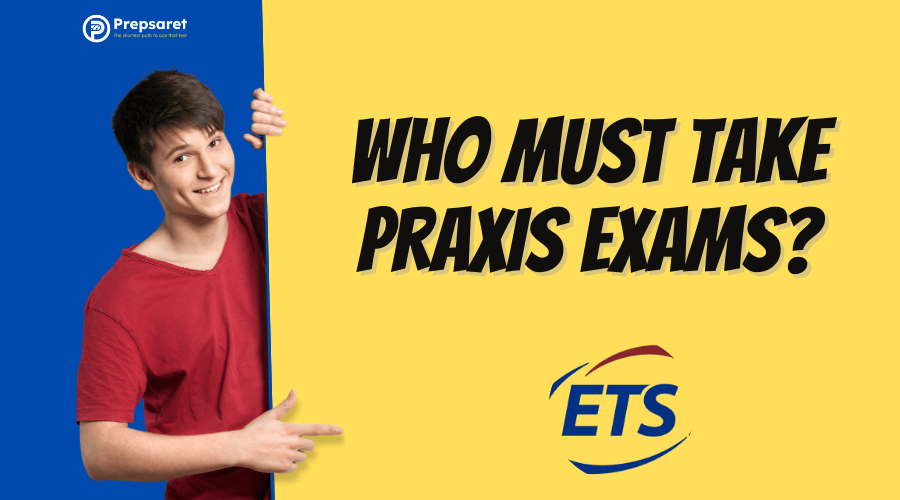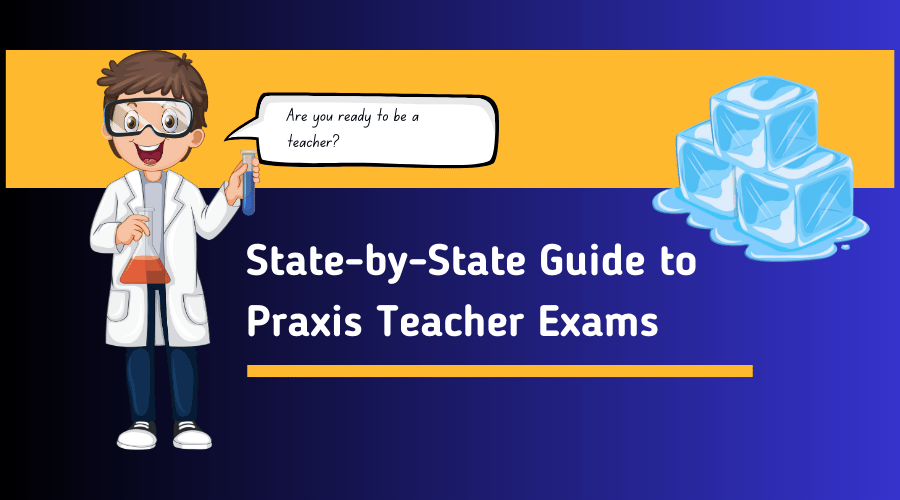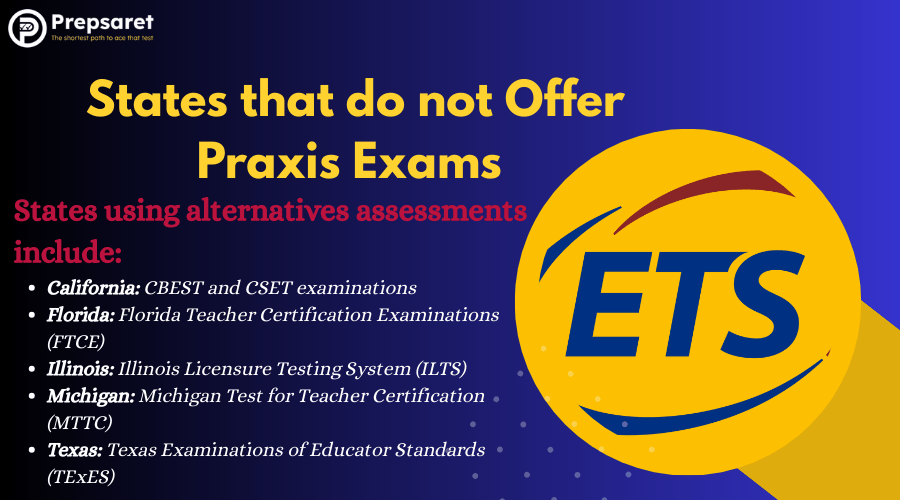Navigating State by State Praxis requirements can feel overwhelming for aspiring educators, but understanding these essential assessments is crucial for your teaching career. The Praxis exams serve as standardized measures ensuring teachers possess the knowledge and skills necessary for effective classroom instruction.
Whether you’re pursuing Praxis for teachers certification or exploring teacher certification by state options, this comprehensive guide examines how educator credentialing varies across the United States.
At Prepsaret, we understand the importance of thorough preparation for these critical assessments that determine your teaching future.
What Is Praxis and Who Needs It?
The ETS Praxis series consists of standardized assessments designed to evaluate prospective teachers’ knowledge and teaching abilities. These teacher licensure exams are administered by Educational Testing Service (ETS) and serve as gatekeepers for entering the teaching profession in most states.
Types of Praxis Exams
Understanding the difference between Praxis Core vs Praxis Subject assessments is essential for proper preparation:
- Praxis Core Academic Skills for Educators: Tests basic academic skills in reading, writing, and mathematics
- Praxis Subject Assessments: Evaluate knowledge in specific teaching subjects and grade levels
- Praxis Content Knowledge for Teaching: Measures subject-specific pedagogical knowledge
Who Must Take Praxis Exams?
Teaching certification tests are typically required for:
- Traditional teacher preparation program graduates
- Alternative teacher certification candidates
- Out-of-state teachers seeking reciprocity
- Educators adding new endorsements or certifications
The Praxis certification requirements vary significantly by state, with some requiring all three exam types while others mandate only specific assessments. Praxis exam requirements also differ based on the grade level and subject area you plan to teach.
Praxis Score Requirements and Policies Overview
Praxis passing scores are established by individual state education departments rather than ETS, creating variation in minimum passing score requirements across the nation. Understanding Praxis licensing by state policies helps educators plan their certification journey effectively.
General Praxis Scoring Trends
Most states follow similar patterns in their teacher testing policies:
- Praxis Core Academic Skills scores generally require a minimum of 150 in Mathematics, 156 in Reading, and 162 in Writing in most states, with exceptions such as Washington and North Dakota having slightly different cutoffs.
- Praxis Subject Assessments usually require passing scores between 140-180, depending on the content area and state-specific standards.
- Different teaching standards per state influence the exact passing score thresholds and testing requirements.
- Some states allow candidates to average scores across multiple attempts, but most enforce waiting periods and restrict the number of retakes.
Praxis Policy Considerations
Education department requirements often include:
- Mandatory completion of Praxis exam within specific timeframes
- Limited retake opportunities with waiting periods between attempts
- Score validity periods (typically 10 years)
- Reciprocity agreements with neighboring states
Prospective teachers should consult their state’s education department or official ETS resources to verify current testing policies before registering
How Praxis Scores Are Calculated and Reported
Praxis raw scores—the number of questions answered correctly—are converted to a scaled score ranging from 100 to 200 to account for variations in exam difficulty. Scores are sent to candidates’ official Praxis accounts and reported to the agencies they designate at registration
State-by-State Guide to Praxis Teacher Exams
Which states require Praxis for teacher certification? Understanding which states require Praxis for teacher certification is key for educators planning their certification paths across different regions.
While the majority of states mandate Praxis exams, several have adopted alternative assessments or do not require Praxis at all. This comprehensive guide examines the State by State Praxis requirements, highlighting regional variations and helping prospective teachers navigate state-specific expectations.
Praxis Requirements in the Northeast
The Northeast region demonstrates significant variation in State by State Praxis requirements, with some states maintaining comprehensive testing protocols while others have modified their approaches.
Connecticut requires both Praxis Core and Subject Assessments for initial certification. Praxis test requirements by state in Connecticut include passing scores of 156 in each Core area and subject-specific minimums ranging from 157-172.
Massachusetts has unique requirements where candidates must pass the Massachusetts Tests for Educator Licensure (MTEL) rather than traditional Praxis exams, though some reciprocity exists for out-of-state candidates.
New York requires the Educating All Students (EAS) exam and Academic Literacy Skills Test (ALST) instead of Praxis Core, plus Content Specialty Tests that align with Praxis Subject Assessments.
Pennsylvania mandates both Praxis Core (with 156 minimum in each area) and relevant Subject Assessments. Praxis requirements for elementary teachers by state in Pennsylvania include Elementary Education: Multiple Subjects with a 160 minimum score.
Virginia maintains comprehensive Virginia Praxis passing scores requirements including Core (156 each area) and Subject Assessments. Elementary teachers need 156 on the Elementary Education: Multiple Subjects exam, while secondary teachers must pass subject-specific assessments with scores typically ranging from 156-162.
Understanding how to pass the Praxis in [state name] requires familiarity with each state’s specific score requirements and testing policies, which can change periodically based on state education department decisions.
Praxis in the South and Southeast
Southern states generally maintain strong Praxis requirements, though recent policy changes have created some exceptions.
Alabama requires Praxis Core (156 each area) and Subject Assessments with minimums typically between 145-165. The state also requires the edTPA performance assessment for initial certification.
Georgia mandates both Core and Subject assessments, with State by State Praxis requirements including 156 minimums for Core areas and subject-specific requirements ranging from 146-174.
Florida has eliminated Praxis requirements as of 2022, instead requiring passing scores on the Florida Teacher Certification Examinations (FTCE). This represents a significant shift in State-by-state guide to Praxis teacher exams expectations.
North Carolina requires Praxis Core (156 each area) and Subject Assessments. Elementary candidates need 163 on the Elementary Education: Multiple Subjects exam, while secondary teachers face subject-specific minimums typically between 157-173.
South Carolina maintains traditional requirements with Core (156 each area) and Subject Assessment requirements. Praxis score needed to pass in [state] varies by subject but generally ranges from 156-177 for most teaching areas.
Tennessee requires both assessments with 156 minimums for Core areas and subject-specific requirements. The state also mandates successful completion of an approved educator preparation program.
Praxis Requirements in the Midwest
Midwestern states show mixed approaches to State by State Praxis requirements, with several states maintaining traditional requirements while others have adopted alternative assessments.
Illinois requires the Illinois Licensure Testing System (ILTS) rather than Praxis, though some reciprocity exists for candidates with Praxis scores from other states.
Indiana mandates Praxis Core (156 each area) and Subject Assessments. Teacher licensure tests required in [state] for Indiana include content area exams with minimums typically ranging from 156-170.
Michigan requires the Michigan Test for Teacher Certification (MTTC) instead of Praxis for most teaching areas, though some alternative certification programs may accept Praxis scores.
Ohio has eliminated Praxis requirements for most teaching areas, instead requiring Ohio Assessments for Educators (OAE). However, some reciprocity agreements may still recognize Praxis scores.
Wisconsin requires Praxis Subject Assessments but not Core for most teaching areas. Praxis certification requirements in Wisconsin focus primarily on content knowledge rather than basic academic skills testing.
Understanding how to become a licensed teacher in [state] with Praxis in the Midwest requires careful attention to each state’s specific requirements, as several have moved away from traditional Praxis testing while maintaining alternative pathways for out-of-state candidates.
Praxis in the West and Pacific States
Western states demonstrate the most variation in State by State Praxis requirements, with several major states using alternative assessment systems.
California does not require Praxis exams, instead mandating the California Basic Educational Skills Test (CBEST) and California Subject Examinations for Teachers (CSET). State by state praxis requirements California information often confuses candidates, but California’s system operates independently of ETS Praxis assessments.
Oregon requires Praxis Core (156 each area) and Subject Assessments with minimums typically ranging from 156-168. The state maintains traditional Praxis licensing by state requirements despite regional trends toward alternative assessments.
Washington mandates both Praxis Core and Subject Assessments, with 156 minimums for Core areas and subject-specific requirements. Elementary teachers need 157 on the Elementary Education: Multiple Subjects exam.
Nevada requires Praxis Core (156 each area) and relevant Subject Assessments. Secondary teachers must achieve subject-specific minimums typically ranging from 157-173.
Alaska maintains Praxis requirements including Core (156 each area) and Subject Assessments, with additional requirements for teachers in bilingual or special education settings.
The variation in State by State Praxis requirements across western states requires careful research for educators considering interstate mobility or initial certification in these regions.
Praxis Alternatives and Exceptions Across States
Understanding States that do not require Praxis exams is crucial for educators exploring different certification pathways. Several states have developed alternative assessment systems or modified their requirements in recent years.
States That Do Not Require Praxis Exams
Do all states require Praxis for teachers? No. States using alternatives assessments include:
- California: CBEST and CSET examinations
- Florida: Florida Teacher Certification Examinations (FTCE)
- Illinois: Illinois Licensure Testing System (ILTS)
- Michigan: Michigan Test for Teacher Certification (MTTC)
- Texas: Texas Examinations of Educator Standards (TExES)
Alternative Pathways
Praxis test alternatives by state often include:
- Portfolio-based assessments demonstrating teaching competency
- Performance evaluations through supervised teaching experiences
- Master’s degree holders may receive testing waivers in some states
- Military personnel often qualify for alternative certification tracks
Recent Policy Changes
Several states have modified their requirements:
- Ohio transitioned from Praxis to Ohio Assessments for Educators (OAE)
- Louisiana has considered eliminating Praxis requirements but maintains them currently
- Florida eliminated Praxis in favor of state-specific assessments
- Georgia has discussed potential changes but maintains current requirements
These changes reflect ongoing debates about the effectiveness and necessity of standardized teacher testing, with some states prioritizing local control over national assessments.
State by State Praxis Test Scores
Accessing comprehensive State by state praxis requirements pdf resources helps educators organize their certification planning effectively. While ETS provides official score requirement information, consolidated resources offer valuable quick-reference materials.
Available Resources for Praxis Scores
Passing Praxis scores by state information can be found through:
- ETS official score requirement databases
- State education department websites
- Professional education organizations
- Teacher preparation program resources
Praxis Score and Online Reference Materials
Praxis scores by state pdf compilations typically include:
- Minimum passing scores by subject area
- State-specific testing policies
- Reciprocity agreement information
- Alternative pathway descriptions
Staying Current on Praxis Scores and Requirements
Score requirements and policies change periodically, making it essential to verify current information through official state education department websites and ETS resources. Many states update their requirements annually or biannually based on legislative changes and education policy developments.
Related post: Free praxis core practice test questions
State by State Praxis requirements: FAQs
Does It Matter What State You Take the Praxis In?
The physical location where you take the Praxis exam doesn't matter, as scores are transferable between states. However, different states have varying score requirements and may require different test combinations for certification.
What Is the Hardest Praxis To Pass?
Subject-specific tests in areas like mathematics, science, and special education often have lower pass rates due to content complexity. However, difficulty varies based on individual background and preparation quality.
Is Louisiana Getting Rid of the Praxis?
As of recent updates, Louisiana continues using Praxis exams but may modify requirements. Check the Louisiana Department of Education website for current information about any policy changes.
Can I Teach Without Passing Praxis?
Most Praxis-requiring states mandate passing scores for full certification. However, some states offer emergency or provisional licenses that allow teaching while completing certification requirements.
Are They Getting Rid of the Praxis?
No widespread elimination of Praxis is occurring. While individual states may modify requirements, ETS continues developing and administering Praxis exams for participating states.
State by State Praxis requirements: Final Thoughts
Successfully navigating State by State Praxis requirements is vital for teacher certification and career success. Whether seeking initial certification or interstate mobility, understanding your state’s specific teaching license requirements and Praxis certification requirements early ensures adequate preparation time.
While educator prep programs provide core knowledge, focused study of your state’s exam policies and praxis passing scores is crucial. Our platform at Prepsaret offers up-to-date practice questions and explanations tailored to these requirements.
Because Praxis score requirements by state can change, always confirm details with official state education departments and ETS before starting your preparation journey.




